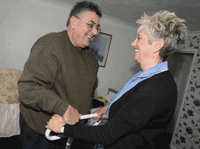
Reablement services are being expanded significantly across England on the back of £648m transferred from the NHS to local authorities this year.
Sixty per cent of English councils are expanding or setting up reablement services using money transferred from primary care trusts, making it the most popular use of the health money, Community Care has found.
Freedom of Information requests answered by 117 of the 152 English councils indicate that the £648m is set to be transferred to councils in full, and that most authorities are using it exclusively for adult social care.
Reablement involves, typically, six weeks of intensive home-based support to help people recover independence following crisis or hospital discharge, and is seen as a crucial way of minimising costs to health and social care.
The College of Occupational Therapists said new reablement posts were being created for occupational therapists.
“Occupational therapists are making a core contribution to the reablement team through training care staff, assisting at midway reviews, and ensuring ongoing links with their local community on discharge from the reablement services,” said professional operations director Julia Skelton.
The expansion of reablement is likely to be greater still because PCTs have additionally been given £150m this year by the government to spend on reablement directly.
The transferred funding, which will flow from the NHS to councils every year until 2014-15, was announced in last year’s comprehensive spending review to give adult care some protection from 28% real terms cuts in government funding from 2011-15.
Almost three-quarters of councils (72%) are using the money for adult social care only, while a quarter are combining spending on adult care with investment in children’s social care or joint work with the health sector.
After reablement, the next most significant areas for investment of the NHS funds are telecare or telehealth services (34% of councils), prevention or early intervention (32%) and support to carers (32%).
The findings indicate that councils are using the money as intended by the Department of Health by investing in services that relieve pressures on the NHS.
Peter Hay, president of the Association of Directors of Adult Social Services, said the findings were encouraging and showed councils were setting up sustainable services with the NHS resources.
Concerns were raised by the United Kingdom Homecare Association, however, about the predominance of in-house council provision of reablement. “Our view from a best value perspective is that the independent sector should be offered the opportunity to deliver as well, but sadly we aren’t seeing a lot of that,” said UKHCA chair Mike Padgham.
Gordon Conochie, joint policy and parliamentary officer at The Princess Royal Trust for Carers, said the PCT money being used for carers was covering “massive cuts from council funding”.
Council says reablement service will save £17m
“Following a stroke I had to have intensive care support. I’ll soon be able to get out of this room and go upstairs – to not only get to the loo, but also to my room and finish building my model railway. This is my ambition.”
Model rail enthusiast Rob Simnet (pictured above) from Staffordshire needed intensive reablement support following a stroke to successfully get his life back on track.
He has benefited from Staffordshire Council’s investment in the service.
Thanks to £9.75m transferred from the NHS, the council is now offering users 12 weeks’ free reablement, up from six, the norm across the country.
But Staffordshire believes the expanded service will yield savings of £17m in the first year alone, based on 3,000 people using it. Pilots of the 12-week Living Independently Staffordshire service found that more than half of service users did not need further support and were able to go back to living independently.
“I firmly believe that six weeks was not enough for most people,” said cabinet member for adults and well-being Matthew Ellis. “We will catch a lot more people.
“In other counties it seems that quite the opposite is happening. The free time is being cut from six weeks to three weeks and in some places to nothing. I don’t understand why.”
The Living Independently service is being provided by expanded joint health and social care teams including specialist social workers, occupational therapists, mental health support workers and home care staff, who provide lower-level support.
Service delivery lead for the Newcastle district of Staffordshire Christine Wheeler said: “We’ve had examples where people have come into the service, been referred for care support and been referred to the Living Independently Staffordshire office and within a week have been able to regain independence.”
Picture caption: Rob Simnet has benefited from council investment in reablement
Related stories
Lansley: Councils have stabilised eligibility thresholds with NHS cash
Councils to get hands on most of NHS £1bn for social care
Councils illegally charge for reablement services
What do you think? Join the debate on CareSpace
Keep up to date with the latest developments in social care Sign up to our daily and weekly emails


 Assistive technology and dementia: practice tips
Assistive technology and dementia: practice tips  A trauma-informed approach to social work: practice tips
A trauma-informed approach to social work: practice tips 




 Find out how to develop your emotional resilience with our free downloadable guide
Find out how to develop your emotional resilience with our free downloadable guide  Develop your social work career with Community Care’s Careers and Training Guide
Develop your social work career with Community Care’s Careers and Training Guide  ‘Dear Sajid Javid: please end the inappropriate detention of autistic people and those with learning disabilities’
‘Dear Sajid Javid: please end the inappropriate detention of autistic people and those with learning disabilities’ Ofsted calls for power to scrutinise children’s home groups
Ofsted calls for power to scrutinise children’s home groups Seven in eight commissioners paying below ‘minimum rate for home care’
Seven in eight commissioners paying below ‘minimum rate for home care’
 Facebook
Facebook X
X LinkedIn
LinkedIn Instagram
Instagram
Comments are closed.